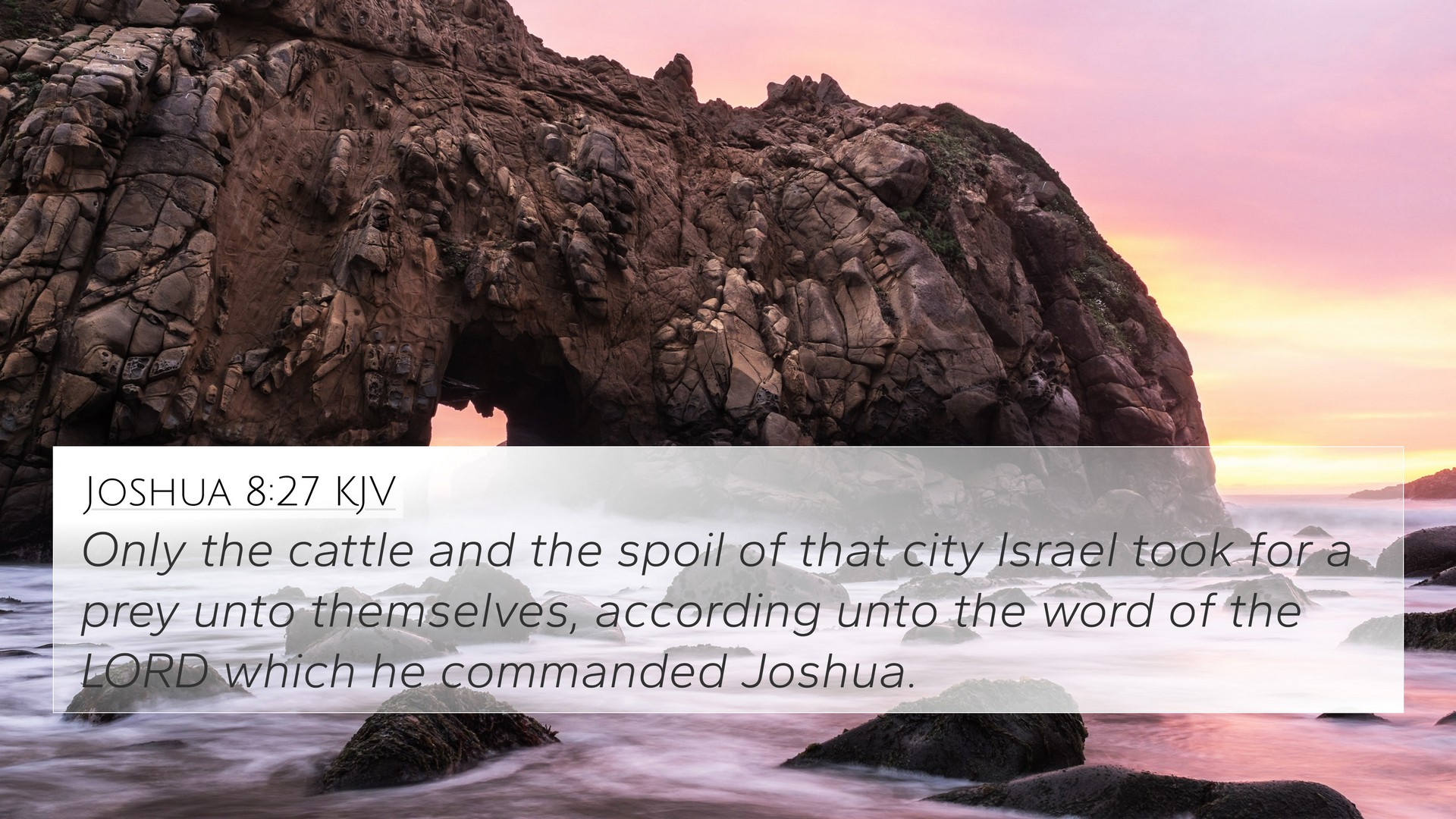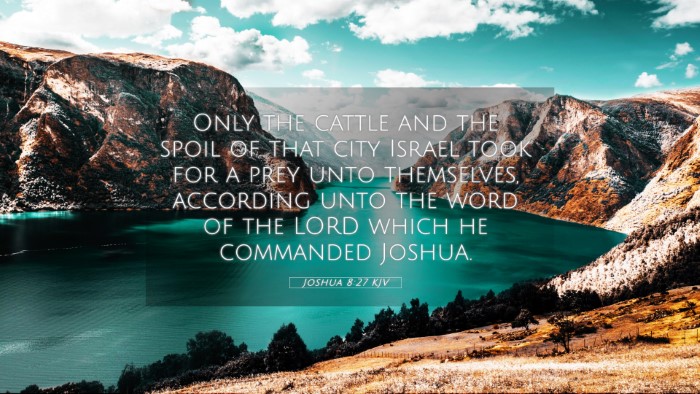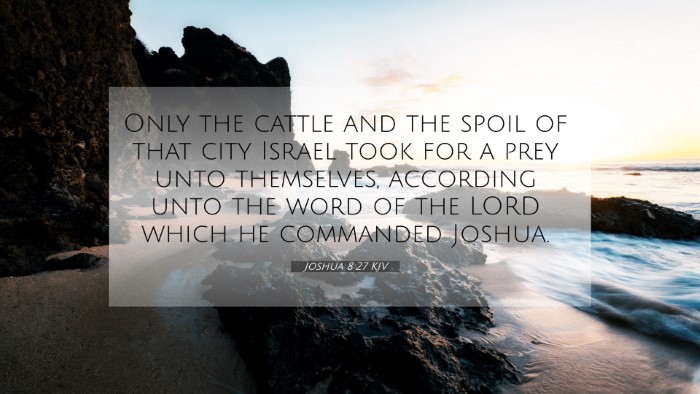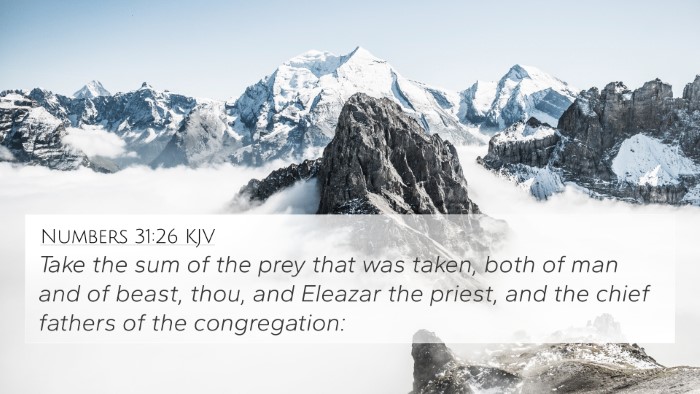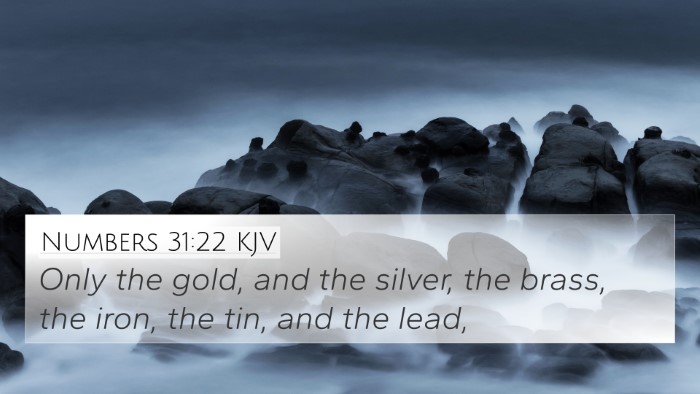Meaning and Interpretation of Joshua 8:27
Joshua 8:27 states: “Only the cattle and the spoil of that city Israel took for a prey unto themselves, according unto the word of the Lord which he commanded Joshua.” This verse encapsulates a critical moment in Israel's conquest of Ai, demonstrating both God's faithfulness and the importance of obedience to divine commands.
Summary of Insights from Public Domain Commentaries
This section combines biblical scholar insights from Matthew Henry, Albert Barnes, and Adam Clarke regarding the meaning of Joshua 8:27:
-
Matthew Henry:
Henry emphasizes that the Israelites were instructed to only take the spoils after their victory at Ai, affirming that they acted in accordance with God's command. This act of taking the cattle and spoil illustrates God’s provision and the justice of their warfare.
-
Albert Barnes:
Barnes draws attention to the contextual significance of the spoils. He notes how taking the spoils was an acceptable practice in ancient warfare but highlights that this was only permissible following a decisive victory, reinforcing God's promise to bless Israel should they follow His orders.
-
Adam Clarke:
Clarke provides a broader perspective on the moral and spiritual implications of God's directive to Joshua. He interprets the spoils given to the Israelites as a reward for their obedience, underlining the relationship between divine commands and earthly rewards.
Cross-References and Thematic Connections
To fully understand Joshua 8:27, it is insightful to examine its connections and cross-references within the biblical text. Here are 10 related verses that aid in a more comprehensive analysis:
- Deuteronomy 20:14: This verse explains the allowance of taking spoils in warfare, giving context to Israel’s actions in Joshua 8:27.
- Joshua 1:7-8: God's instruction to Joshua about obeying His law relates to the success Israel experiences in claiming their rewards.
- 1 Samuel 15:21: The consequences of disobedience and improper taking of spoils are explored, reinforcing the need for adherence to God's directives.
- Romans 8:28: This verse about God working for the good of those who love Him can be compared to the Israelite experience of victory in faithful obedience.
- Psalm 37:4: The promise that God grants desires of the heart might reflect the success of Israel in obtaining the spoils as they align with His commands.
- Proverbs 11:21: This verse addresses the outcome of the wicked versus the faithful, drawing a parallel to the Israelites' reward for faithfulness.
- Matthew 6:33: This New Testament verse encourages seeking God's kingdom first, connecting to Israel’s pursuit of God’s will in their actions.
- Galatians 6:7: The principle of sowing and reaping can also be reflected in the consequences of Israel’s obedience to God's command.
- Hebrews 11:30: This verse highlights the faith of Israel that resulted in the fall of Jericho, reinforcing the blessing that follows obedience as seen in Ai.
- Revelation 22:12: The promise of rewards for faithfulness seen in the New Testament corresponds to the reward Israel received after their obedience in Joshua 8:27.
The Importance of Obedience and God’s Provision
The overarching theme in Joshua 8:27 emphasizes the significance of obedience to God. The actions of the Israelites not only yielded physical spoils but also represented spiritual triumph through adherence to divine instruction. This illustrates the biblical principle that obedience brings blessings, a motif that echoes throughout Scripture.
Conclusion
In delving into Joshua 8:27 and its surrounding context, students of the Bible can gain a deeper understanding of how faithful obedience leads to divine provision and blessings. The interconnectedness of such themes across Scriptures enhances one's understanding of God's overarching narrative and His promises to those who follow Him.
Utilizing cross-references is essential for exploring these themes comprehensively and is a powerful tool for anyone engaged in Bible study.
